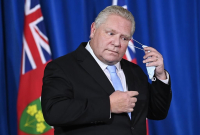Support strong Canadian climate journalism for 2025
New restrictions to fight skyrocketing rates of COVID-19 were being considered by Ontario's cabinet Monday night, although a curfew was not one of them.
The discussion took place as the province hit the grim milestone of recording more than 5,000 deaths from the virus since the start of the pandemic.
Premier Doug Ford said residents can expect an announcement on new measures on Tuesday, when the province will also make new COVID-19 projections public.
"We worked all weekend ... right until late hours last night," he said as he arrived at the legislature ahead of Monday night's cabinet meeting.
"We'll be going to cabinet with recommendations."
Ford did not elaborate on the recommendations but has said the current provincial lockdown may need to be extended and stricter measures could be imposed if cases continue to soar.
Dr. Barbara Yaffe, Ontario's associate medical officer of health, said a curfew was not among the recommendations going before cabinet, adding that she had seen no evidence one would be effective.
She noted, however, that current trends in the province were "scary" and said as many as a third of residents surveyed reported they are not following public health guidelines.
"The bottom line is people know what they should be doing," she said. "It's a shame that we have to wait for government to force them into doing the right thing."
The latest spike in cases can be attributed in part to people gathering over the holidays, growing outbreaks in long-term care and retirement homes, and workplace outbreaks, Yaffe said.
More must be done to help residents comply with public health rules, she said, including instituting paid sick days, bringing in eviction protections, and making isolation hotels available.
"It's not going to be an easy few weeks," Yaffe said. "But what these trends demonstrate is that further actions are necessary."
Officials in government and health-care have warned that surging cases are putting great strain on the health-care system.
Projections made public in late December showed that Ontario’s ability to control the spread of COVID-19 was “precarious,” but tough lockdowns lasting a month or more could cut the number of daily cases significantly.
That data, released on Dec. 21, showed that if COVID-19 case rates continued to grow between one to three per cent, the province would have 3,000 to 5,000 daily cases by the end of January.
Ontario has recorded well over 3,000 cases daily for the last week, with 3,338 new cases reported Monday.
It also reported 29 new deaths from COVID-19 on Monday, bringing the total number of deaths reported to 5,012 since the start of the pandemic.
The government said 1,563 people are currently hospitalized with the virus, with 387 people in intensive care and 268 on ventilators.
NDP Leader Andrea Horwath accused the Ford government of "stalling" on new public health restrictions, a move she said will cost lives.
"Tougher measures are not only overdue, they must be backed by a major investment in immediate supports like paid sick days for every Ontarian, safe isolation facilities, and direct financial help for small business owners and individuals," she said in a statement.
Liberal health critic John Fraser said the government is displaying a "lack of urgency" despite the rising death toll from the virus.
"We have seen firsthand how delays cost lives," he said in a statement. "Time is our greatest asset during a pandemic.”
Meanwhile, the medical officer of health for Windsor-Essex said that his hard-hit region has now completed the first round of COVID-19 vaccinations in all its long-term care homes.
The provincial government pledged last week to give COVID-19 vaccines by Jan. 21 to all long-term care residents, workers and caregivers in hot-spot regions.
Dr. Wajid Ahmed said Monday that he believed Windsor-Essex had become the first health unit in the province to accomplish the goal.
"Our long-term care homes have seen the worst of the outbreaks," he said. "They have really come through. They really worked with us to get all of this done ahead of schedule."
On Monday, Ontario reported giving 8,859 more doses of the vaccine since its last daily update, with 122,105 total doses now administered.
This report by The Canadian Press was first published Jan. 11, 2021.





Comments